#hero character analysis
Text
What Hero's Attempts to Comfort Sunny on the Night of "Two Days Left" Tell Us About His Character
Hi Hero Enthusiasts, let's talk about one of the only times Hero talks about himself and his grief in the entire course of the game...

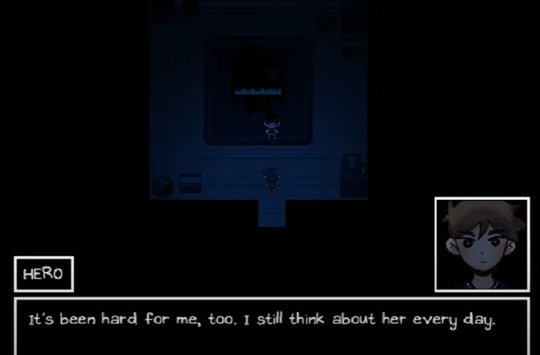
It is easy to see this as just usual, selfless Hero being in-tune to others' emotions and trying his best to help any way he can. On the surface, Hero appears to be well-adjusted and at a sense of peace with what happened. When he reassures Sunny that Mari "would always want [them] to be happy even if it was without her" thereby encouraging him that it's okay to move forward and find healing, the player of the game believes him. Arguably, even Sunny believes him to a certain degree, but the real question here is: does Hero believe himself?
Let's Discuss Under the Cut...
(Warnings: OMORI spoilers. Heavy themes including death, grief, depression, and guilt).
It really says a lot about Hero that this scene is one of the only moments he talks about himself and his grief in the entire course of OMORI though it makes sense in the context. Being such an empathetic person, Hero could probably fairly easily pick up on the fact that Sunny was thinking about Mari in the piano room in the middle of the night, so, of course, he would start talking about her in attempt to comfort him.
However, it does beg the question: is it deeper than that? Is Hero so quick to put this together because that's what he, himself, was doing in the piano room in the middle of night? If Hero was there to grieve Mari, it would make sense that he so easily jumped to the idea that Sunny was there to grieve her as well, but he immediately stops everything and pushes aside his own grief and his own feelings to try to comfort Sunny.
On that point, it is clear from the context that Hero is only sharing what he thinks will be helpful or comforting. He says "It has been hard for me too" to show empathy, to try to tell Sunny that it's okay that he still misses Mari and that he isn't alone in missing her. He expresses his own complicated feelings surrounding how (he believes) she died, but he ultimately reassures Sunny that Mari would want them all to be happy even in a world without her thereby encouraging him to find healing and to move forward.


There is a painful irony in hearing this from Hero knowing that after losing Mari, he curled in on himself and spiraled into a deep depression that was all-consuming and that the survivor's guilt almost destroyed him. He just shut down and stopped living until eventually, he threw himself in his school and extracurricular activities, always striving to stay too busy to fall apart. Even his choice to pursue a degree in medicine will require years of school with long hours of study and clinicals, then residency, and eventually work itself. As a doctor, Hero can really just hide in his busyness, and that's really all he seems to want anymore.
Though Hero would be the first to wholeheartedly insist to Sunny that Mari would want them to learn to be happy again and that they can find healing and move forward, the truth is that for Hero himself time stopped when Mari died. Life stopped. All of his dreams for the future died with her, and given his survivor's guilt, he honestly thinks that's what he deserves, regardless of what Mari would have wanted for him (but that's a topic for another discussion). For now, to summarize, there is something so lost and listless about Hero in the Real World after Mari's death. He doesn't really know what he wants out of a life without Mari besides not hurting anyone and staying so busy that he just doesn't feel anything anymore.
But despite his best efforts to remain completely numb to it all, that grief and that pain inside of him doesn't go away, and no matter how hard he may try to push it aside, it's still there. He has just locked it away, brushing it under the rug or slamming it behind the door--whatever it takes to be able to function and not drown in it again, because (as the end this scene itself ultimately showcases), Hero is still overwhelmed by it all.
This is reason enough that he doesn't talk about it and doesn't want to talk about it, but arguably another, possibly even bigger reason is that Hero is terrified of being a burden on others. When looking at this situation from the outside, one would think that Hero would have a lot of support and understanding given that so many of his loved ones are also grieving Mari. Everyone grieves differently but there can be a powerful comfort in surrounding oneself with people who also experienced the same loss and who also knew and loved that person. This moment with Sunny could have been an opportunity for Hero and him to really empathize with each other over having lost someone they both loved (albeit in different ways), but Hero would never ever, ever even dream of talking about his grief with Sunny or with Basil, Aubrey, and Kel for that matter. He sees himself as their "Big Brother" and because of that, he feels he constantly has to push aside anything he may be feeling or may want for himself to take care of them. And there is an added problem here that he doesn't feel he has done a very good job of that.
He blames himself not only for Mari's death, but for Kel, Basil, Aubrey, and Sunny's pain as well. Their friend group is fractured--the day's events at the lake have proven that, and in a way, Hero feels like this is his fault. If he hadn't been so depressed and broken himself, he would have been able to help his brother and his friends who have always felt like siblings to him, but he was too weak, too helpless and now they're fighting amongst themselves and miserable.
He feels he has no right to talk about his problems with them, but the truth is, he feels he has no right to talk about his problems with anyone. And this goes back to his one (1) fight with Kel (which, honestly probably deserves its own analysis post one day). Kel was terrified to see Hero spiral into such a dark place and felt like he is losing his brother. When he finally confronted him about it, however, Hero snapped--finally crumbling under the weight of everything that has gone wrong and all the pain he has been carrying around alone. It was, arguably, the one and only time in their lives that the two had ever really fought, and it (most likely) remains one of Hero's greatest regrets. He now lives in fear that his relationship with Kel is permanently and irreparably damaged--that nothing he could say or do and no amount of apologizing could ever erase that distance between them. Hero is terrified that Kel will never really open up to him again and that he'll always feel like he needs to walk around eggshells around him. He is scared that Kel must think he hates him, and he can't bear the thought that it's all his fault and no amount of apologizing will ever make it right.
The whole experience leaves Hero broken and overwhelmingly guilty (even though no one blames him Kel least of all), and while he does come out of the worst of his depression, he is still depressed. He hasn't found healing and closure. All he has really done is gotten better at hiding how miserable he is because he is terrified of ever hurting anyone in the same way he hurt his brother. Vowing to never be responsible for causing pain to his loved ones because of his problems, he buries and represses his emotions and his pain--managing to hide them from everyone but himself.
This is made all the more apparent when, as soon as Sunny leaves, Hero breaks down into tears overwhelmed by his own, repressed grief.
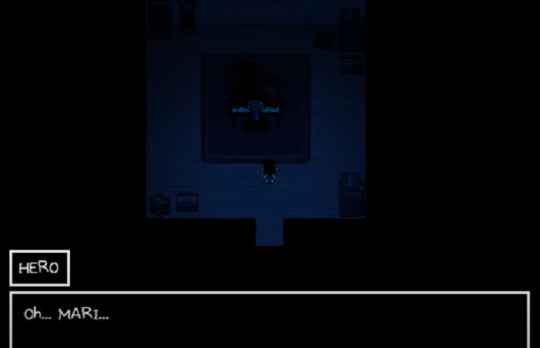
From this incredibly vulnerable moment (arguably Hero's most vulnerable moment in the entire game), it becomes clear to the player that all of the "well-adjustment" and acceptance Hero had been displaying up until this point is, at least to a certain extent, for show.
Hero is not okay. He just wants everyone to think he is.
#omori hero#hero omori#omori sunny#omori#omori analysis#omori meta#hero character analysis#omori spoilers#thanks for reading
131 notes
·
View notes
Note
Do you have any songs for Hero from Omori for the game? Thanks
Oh my goodness I have so many songs for Hero from OMORI that it'll honestly be hard to narrow it down 😅, but I'll share a couple of my favorites plus some related Hero post-"Truth" headcanons! Thanks for playing my song + headcanon game and for the chance for some Hero appreciation (he really deserves it 💙).
I've put your songs and headcanons below the cut because of MAJOR OMORI spoilers (and warnings for the heavy themes & subject matter (i.e. grief, death, mental health issues) that go along with that).
There really are so many songs out there that remind me of Hero (who is probably tied for the title of my favorite OMORI character), and honestly, I didn't know how angsty you wanted to go with this ask so I've chosen two songs: a sad one and a less sad one.
Sad Song Choice: "Older Than I Am" by Lennon Stella
I feel like this just might be the ultimate Hero song. I mean with opening lines like "My heart's seen things I wish it didn't/Somewhere I lost some of my innocence, and I miss it" how could it not be? There's something so hauntingly tragic about this song, and I think it just fits Hero so well given how he has been through so much in his life and how he has had to grow up far too quickly. He prides himself on doing everything right, on taking care of everyone else around him and never wanting to be a burden on anyone ("I do all my own healing/Manage all of my feelings/I don't ask for help, no/'Cause I don't need it"), but sometimes it does get to be a lot for him: leaves him faking happiness and contentment while really he is breaking inside and feeling lonely and listless as he tries to keep up this charade of being "fine" ("Why am I always the one making decisions?/How do I handle the pressure?/I do my best to fake it, but honestly I hate it").
There are probably times when he wishes he "could do something stupid" and "be kinda reckless." There is probably a part of him that wishes he could "just say to hell with all [his] plans"--could "say I don't give a damn," but the problem is he does give a damn--he cares too much. He's too responsible, too dutiful, too conflict-avoidant, and too worried about hurting and burdening everyone else. Ultimately, he would never do those any of those things because just like the singer in the song, he would stop himself and be forced to admit that no matter how much he wishes he could just throw in the towel, set aside this "perfect" facade for just a minute, he won't--he can't because he's Hero and there is always that voice in the back of his head reminding him "But I'm older than I am" and stopping him.
Lennon Stella - Older Than I Am (Lyrics) - YouTube
Less Sad Song Choice: "Two" by Sleeping At Last (A/N: it’s not really that sad of a song but the Hero context makes everything sadder)
I'm not even sure where to start with this song since there are so many lines that make me think of Hero starting not least of all with the very first: "sweetheart, you look a little tired--when did you last eat?" Beyond just his penchant for cooking for his loved ones, Hero really wants nothing more than to take care of people. He has such a genuine generosity and selflessness that he truly "will love you without a single string attached" and would not hesitate to put someone else and their needs in front of his own--bending over backwards to help them or make them happy, even if it is at his own expense or to his own detriment ("you know I’ll take my heart clean apart, if it helps yours beat" and "you can take the oxygen straight out of my own chest.").
While he would be the first to offer help, support, even the shirt off his back to someone who needed it, he struggles with asking for help himself, can't stand being the center of attention, and does not like talking about himself or his own problems because he deeply fears being a burden to others ("no, I don’t want to talk about myself—tell me where it hurts."). After he begins to heal from that period of deep depression he experienced immediately following the loss of Mari, Hero consistently buries his own pain, grief, and sadness--deeply afraid of hurting or burdening his family, friends, or any of his loved ones like that again (even though, of course, the ones who love him want to be there to support him, no matter what he's going through).
He knows he's wounded and hurting, but he pushes it aside in favor of helping others. When Sunny finds him at Mari's piano in the middle of the night, for instance, Hero is "fine"—immediately jumping into trying to support and comfort Sunny, but if you go back into the room immediately afterwards, Hero is crying by himself, just unwilling and unable to express his own pain and sadness to someone else. It's absolutely that "I just want to build you up, build you up ’til you’re good as new, and maybe one day I will get around to fixing myself too" sentiment.
Finally, the line "I just want to love you, to love you, to love you well. I just want to learn how, somehow, to be loved myself" in the bridge just gives me chills when I think about in the context of Hero. He is such a big-hearted, empathetic, and sincerely loving person, but he deeply struggles to accept the love and support from others that he gives away so generously.
Sleeping At Last - "Two" (Official Lyric Video) - YouTube
Here Are Some Hero Post-"The Truth" Headcanons Inspired by These Songs:
When Hero learns "The Truth," he quietly excuses himself from the room to deal with and process his emotions alone. He feels overwhelmed, hurt, upset, angry, heartbroken and so many other stormy, complicated emotions, and despite (perhaps) wishing he could unleash that whole internal turmoil, he stops himself--recalling with a painful regret that one (1) time he lashed out at Kel after Mari's death and knowing that he is not that 15 (or 16) year old boy anymore. He is an adult (albeit a 19-year-old adult but still an adult), and he will act like one, regardless of how he feels on the inside because he really is older than he is.
After crying bitterly alone and trying his best to make sense of the Truth and of everything he is feeling, Hero experiences a moment in which it really just "clicks" in his head that even if he has complex feelings about Sunny and Basil right now, Sunny and Basil are suffering in a similar way to how Hero himself suffered for years. Hero has blamed himself for what happened to Mari all this time--mentally beating himself up for not even knowing she was depressed and driving himself in painful circles wondering if he had just reached out to her, had made sure she understood she could aways open up to him, had been more of a support to her, had better expressed how much he cared about her, had held onto her tighter, had loved her better--had loved her more would things have been different? He has carried that weight around for 4 years--blaming himself for her death, and now he sees Sunny and Basil doing the same thing--granted under wildly different (more culpable despite it being an accident) circumstances but the feelings & pain of that overwhelming guilt are very similar, and Hero knows how painful and what a heavy burden that is.
In the end, it's almost like the complicated feelings he might have about Sunny and Basil due to the truth get overshadowed by Hero’s empathy and the fact that he cares for them deeply as if they were his own little brothers, and that is what finally gives him some clarity.
He returns to the room and actually apologizes himself both for suddenly disappearing and for the fact that this has all happened the way it did. He starts to tear up again as he hugs Sunny then Basil, reassuring them that Mari would want them to forgive themselves.
This is not to say that Hero doesn't still have some serious inner turmoil and angst surrounding "The Truth" and all the pain it and its cover up has caused. He does wrestle with complicated feelings towards both Basil and Sunny for some time afterwards (he is only human after all); however, this remains internal turmoil, as Hero absolutely sees it as something he needs to work through on his own with time (and hopefully, eventually, some desperately needed therapy). Additionally, having matured and learned from his one (1) fight with Kel after Mari's death, he does not take this out on Sunny or Basil--not wanting to have to repeat what is one of the greatest regrets of his life (lashing out at his brother).
Even if it takes him a little time, Hero ultimately is one of the most empathetic to Sunny and Basil's feelings surrounding Mari’s death—particularly their guilt, and it is in recognizing a lot of himself and his own grief, pain and guilt in Sunny & Basil that he finally reaches a place of healing and forgiveness with them.
Additionally, in reconciling himself to the situation and making peace with that happened, Hero ultimately blames Mari’s “bad knee”/knee injury for her death more than Sunny, choosing to believe that Sunny didn’t push her that hard so it was really the fact that her bad knee gave out that made her fall down the stairs, whereas an uninjured person wouldn’t have fallen. This inspires him to take a Physical Medicine and Rehabilitation (PM&R) residency when he graduates from medical school, and he becomes a pediatric physiatrist: treating injured children and coordinating rehabilitative medicine after their injuries. He sees it as his way to give back (in a healthy way, of course) and finds a sense of purpose in trying to prevent another tragedy like that from happening by helping other injured children in their recovery.
#hero omori#omori hero#hero omori headcanons#hero headcanons#hero character analysis#hero deserves to be happy#poor hero#he needs a hug#i love him so much it breaks my heart#hero appreciation 💙#this is so self indulgent ngl#song + headcanon game#omori spoilers
7 notes
·
View notes
Text
The context that Bernard knows Tim's Robin means this sentence can be read two ways.
"My boyfriend, named Tim Drake."
"My boyfriend, you."
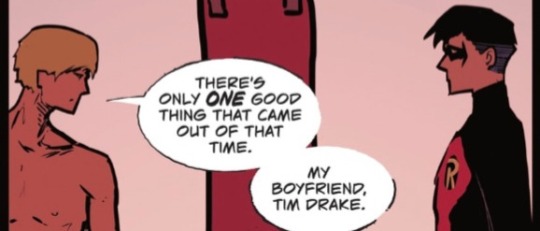
#dc#dc comics#comics#comic books#comic panels#tim drake robin#comic analysis#media analysis#media commentary#tim drake#robin#red robin#bernard dowd#character dialogue#ships#hero x civilian#ship dynamics#timber#timbern#tim x bernard#angst#lgbtq+#canon queer characters#mlm characters#bi characters#dc pride tim drake special#batman urban legends
1K notes
·
View notes
Text
Do you ever just think about how awful it is to be a demigod before you know about it?
I've been thinking about it a lot lately. How much demigod kids and teenagers don't fit in with mortal society. Their mortal parents don't know what to do with them, even if they do care for them immensely. They are labeled as troublemakers, as bad kids, as mentally ill, as freaks and monsters who see things they shouldn't see and have an aversion to authority that they shouldn't have and a strong sense of justice and an inability to sit still, read, play, act, feel normally.
Percy got in trouble for getting into fights, for speaking impulsively, he was mocked and spoken down to and expelled from lots of schools who couldn't handle him and he didn't know why until he was twelve years old. Sally wasn't able to tell him why.
Annabeth was the product of her father's relationship with a goddess, and he loved her for a while, but she wasn't a normal kid. When he fell in love with a mortal and Annabeth didn't get along with her or her kids, he chose the mortal side. How could he understand Annabeth's side? She was just a badly behaved kid, while his new wife and children were the normal good ones.
Jason always knew he was a demigod, he was accepted and praised and tons of expectations were placed on him from a frighteningly young age. Part of the reason the others resent him and see him as a sort of golden child is because he was placed on a pedestal and he will never, ever know what it was like for all of his friends to be looked down on as children, to be scolded for things they didn't understand and told that the things they saw and experienced constantly were not real.
Piper was always loved by her father but I think he loved the idea of her, he loved that she reminded him of the beautiful woman he met years ago. He was always kind to her and usually gave her things she wanted, but he couldn't always spend time with her as his job got busier. Piper sensed that her father's attention was occupied by something else, and as he got busier, she felt less supported and stole things and got in fights and her dad didn't know what to do with her after the BMW so she was sent to a troubled teen program where she was bullied for her disabilities and her race.
Leo feared his power because it killed the person he loved the most, and after that, everything in his life was hell. He didn't feel safe anywhere, he didn't have anyone he could trust, and adults saw him as a troublemaker who would never amount to anything.
The books don't emphasize these things as much with any of the other demigods, or maybe Annabeth, Percy, Piper, and Leo are the best examples we have. I just. They're so tragic. They're all my children all of them. I love them and I feel so sad for them
#heroes of olympus#percy jackson#pjo hoo#hoo#heroes of olympus headcanon#character analysis#unfiltered thoughts#annabeth chase#piper mclean#leo valdez#jason grace#my CHILDREN
494 notes
·
View notes
Text
thinking about how one of kel's first lines is "man, aubrey always gets what she wants". thinking about how aubrey wanted to go see sweetheart's show for hearts, so hero took them all to sweetheart's show for hearts. thinking about how aubrey told molly not to touch omori, and she didn't again.
thinking about how all aubrey wanted was to keep her friend group together. thinking about how aubrey's clothes are too big in headspace, she only has one toy and in the real world, her house is a tip with her room almost bare. thinking about how aubrey wanted to keep the photos of mari and throw the rest in the bin, and how she put them back in the album after kel picked it out of the trash.
thinking about how sunny viewed her as a protector of his as a kid, someone who'd look for for him, and how the hooligans trust her to lead and look out for them, and how hero and mari were like older siblings to her when she was younger, and how aubrey's parents didn't look out for her. thinking about how aubrey is angry and insulted and violent and vengeful, and how she wants the girl she knew as a sister to come back. thinking about how she believes she wasn't enough for her old friends, for anyone. thinking about how little possessions she has, how she pushes away people who care about her, how she's viewed as a "bad kid" by the residents of faraway.
want is such a big theme with aubrey. in headspace, every one of hers is fulfilled. in the real world, we see almost none being.
#yeah so i have auby thoughts today#aubrey omori#kel omori#sunny omori#hero omori#mari omori#basil omori#omori analysis#omori real world#omori basil#omori game#omori headspace#omori sweetheart#omori hero#omori kel#omori#omori mari#omori sunny#omori character
764 notes
·
View notes
Text
The real tragedy of Dune (which the movies did an excellent job of portraying) is that almost none of the characters we see have any real choice in what they do. The only choices they have are in how they do them.
Duke Leto must take House Atreides to Arrakis, or be declared a traitor to the Imperium and hunted down. He knows it's a trap and that the Emperor is, in the very best case scenario, setting him and his family up for a serious reversal of their fortunes (far more likely, he's outright scheming to get them killed). But he doesn't have a choice. He must go to Arrakis. He does go to Arrakis. He dies.
Paul and Jessica must flee into the desert or the Harkonnen soldiers will kill them both brutally. They must go to the Fremen for refuge or the desert will kill them. They go. They find that the Fremen have already begun to mythologise Paul. He's the Mahdi, the Lisan al-Gaib. There is no option for Paul to be a normal person here. He is either the messiah or he is a false prophet, and false prophets in a nation of true believers don't live for long.
So Paul fits himself into the mold of the myth. He becomes Muad'dib and leads the Fremen in war because they believe too much in him to let him be anything less. Is it manipulation? Yes. But because the Bene Gesserit have been manipulating the Fremen for centuries, Paul has no choice but to continue it if he wants to live.
He sees the holy war at the end of every timeline by glimpses and he fights to avoid it. To avoid it, he becomes the Kwizatz Haderach and gains the ability to fully see timelines, and thereby he makes himself that much more of the Fremen messiah and brings himself one step closer to the holy war. Every choice he makes is a choice for survival and an attempt to avoid that war, the war he cannot escape because every step he makes along the path to survival is one more step towards the war. He has no more choice in what he becomes than his father had in whether or not he went to Arrakis.
The only people who ever had a choice were the Emperor and Gaius Helen Mohiam. They made their choice, to exterminate House Atreides, and thereby they took everyone's choices away, including their own. Once they sent House Atreides to Arrakis, the entire plot was inevitable.
#dune#dune part two#winter says things#paul atreides#jessica atreides#leto atreides#character analysis#paul is not the hero but neither is he the villain#he's a duke whose choices have been taken from him#just like his father
366 notes
·
View notes
Text
The original batkid age differences still work in the current comic era, and I'm gonna keep assuming they're canon unless they tell me otherwise. (sequel to this post)
Damian is canonically 14 (as of 2021).
This makes Tim about 21, which fits with his recent 'college dropout who lives alone on a houseboat' character arc (also 2021). A comic in 2015 said Tim was 16 when Damian was at least 10, but since it's a minor difference I'm gonna stick with the ~7 year gap they had pre-n52.
So Jason must be 23 — as far as I know, no canon contradicts this.
And Dick is about 29. This causes some minor issues, actually — in 2014 he was supposedly 21 when he should have been about 24, and in 2018 he's described as 'mid-20s,' which could be a stretch depending on how much in-universe time passed between 2018 and 2021. Overall though, not too messy.
So that makes Cass 24, Steph 21-22, and Babs around 30.
Honestly I have no idea how old Duke is beyond 'high school age" — from at least 2015 to present. Which actually kinda screws things up, if we assume that all the other characters aged 4 years in that time. Like, in 2015 he was closer to Tim's age, and now he seems to be closer to Damian's. For what it's worth tho, I think of him as ~17.
Anyway, point is DC DOES let their characters age (at least since the Rebirth era started in 2016. pretty sure n52 was like, a stasis bubble or something). I'm sure the timeline will continue to get wonkier as the youngest generation of heroes grows up, but for now the Bats seem to be doing alright.
#and I am NOT about to tackle all the other hero families#flashes? never heard of em. I'm sure they age on a TOTALLY normal and linear timeline tho#batman#batfam#dc comics#damian wayne#tim drake#jason todd#dick grayson#ehh no i don't want to tag every character mentioned.#batman meta#dc rebirth#dc new 52#me posting about characters ages as if no other fan has done this kind of analysis before lol
399 notes
·
View notes
Text
thinking tonight about the bruce wayne that went through horrific trauma and decided he would never be unprepared again, that he would prevent as much pain as possible from occurring to others in the future. the bruce wayne that saw a boy who had been orphaned, recognized his rage and his hurt, and decided to help however he could. the bruce wayne that looked at a kid jacking his tires and wondered if he could use something to eat. the bruce wayne who doesn’t know how to leave well enough alone. the bruce wayne that started keeping lollipops in his tool belt to calm down and distract kids. the bruce wayne who loves his city fiercely, who wants things to be better than they are and fights to make them that way, both day and night. the bruce wayne who funds social programs and leads with compassion whenever he can. the bruce wayne who wants his kids to be happier and better than he is. the bruce wayne who doesn’t work alone, who’s best friends with superman. the bruce wayne with routines and habits and plans and backup plans. the bruce wayne with layers. the bruce wayne who is awkward and paranoid and angry and protective and traumatized and loving and strong and brave and relentless. the bruce wayne who is so, so imperfect, but loves, even when a part of him wishes he wouldn't.
#i am not a bruce wayne stan but.#sometimes he makes me :')))))#just. at the heart of his character there's so much.#bruce wayne go to therapy challenge. bruce wayne stop getting written as an alpha male solo hero power fantasy challenge.#bruce wayne stop getting written as someone who would hit his kids challenge. u guys I get so mad#i have such complicated feelings about him but tonight is an appreciation night you're welcome#bruce wayne#dc comics#batfam#batman#batman meta#bruce wayne character analysis#mine#wes.txt
5K notes
·
View notes
Text
the idea of woobiefying lestat (at least as he's written in the show) is just so boring to me. why would you want to erase what makes him such a fascinating character which is he endured horrible suffering and abuse and instead of breaking the cycle he chooses to be an absolute cunt and destroy every chance he has at happiness. why would you want to take all those things away just so he can be your uwu emo blorbo. that's not who he is, he's the cunt you married.
#don't get me wrong lestat is also my blorbo#i don't want characters i relate to who are nice i want characters i relate to who are fucking awful people#let lestat be the dragon you still get to be the hero!!!#interview with the vampire#lestat de lioncourt#iwtv analysis
2K notes
·
View notes
Text
Plurality in Slay the Princess: Part 1
[pt: Plurality in Slay the Princess: Part 1]
Imagine you're standing facing the unknown, and then a little internal voice begins narrating everything you see.
[The Narrator] "You're on a path in the woods. And at the end of that path, is a cabin. And in the basement of that cabin, is a princess. You're here to slay her; if you don't, it will be the end of the world."
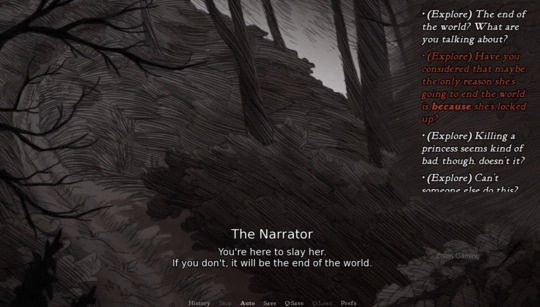
He seems pretty biased.
One of the best indie games to come out in 2023 was Slay the Princess, an indie horror/romance visual novel featuring your player character and the being he's meant to slay, known simply as The Princess. However, you're not alone, in more ways than one- both your player character and the Princess display clear aspects of plurality - aka, multiple identities residing within/utilizing a singular physical body. This can take many forms in real life, from disordered to non-disordered variants, and a good few of them are prominently recognized in this visceral narrative experience.
After the read-more will be some spoilers from the various choices you can make throughout the early game- so while this is part 1, there will be no endgame spoilers yet! It'll start off with Chapter 1 and go deeper from there. If you're intending on playing the game, we HIGHLY recommend you play only after reading Chapter 1 information, or only after this part 1 at most! It's best experienced blind as possible, and trigger warnings are present upon opening the game. This analysis took a while to write, so please consider reblogging if you enjoy!
...
Right from the beginning, the plural undertones of the story are clearly apparent. Once the Narrator stops speaking, you as the one controlling the body are able to communicate by asking various questions directly to the Narrator to press upon, enthuse over, or counter his point. The Narrator is speaking to you mentally, but is not you.
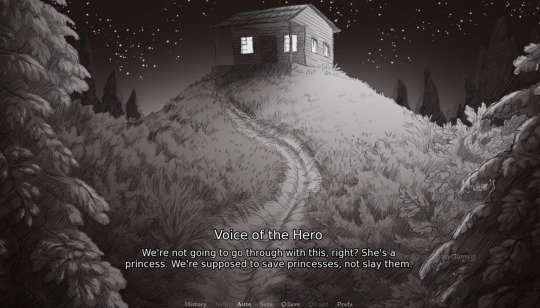
If you continue on the path to the cabin, you're presented with someone else speaking to you internally, titled as "The Voice of the Hero". The Narrator quickly responds with "Ignore him. He doesn't know what he's talking about." This situation tells us a lot of interesting things! First off, the Hero defers to the pronoun "we" - as he's clearly responding to the Narrator's direction, the other individual in this situation must be the controller of the body. The Narrator reinforces this concept by talking directly to you, telling you to ignore the Hero. So right off the bat, there are three people in this body- the Host, whom is being controlled by the player, the Narrator, and the Voice of the Hero. They stay with you throughout (most of) the entire game, so even without much happening, the main character is very blatantly plural. The only thing we can tell about them so far is that they're a polyconscious system, wherein each member displays their own individual consciousnesses rather than sharing one, and can all perceive the world using separate streams of thought.
Let's say you head to the cabin, speak to the Princess, and don't even bother taking the pristine blade meant to slay her, as you're intent on saving her. You speak to her with options using "quotation marks" to indicate vocal speech rather than how you've been thinking to the other members of your system, and you free her from her bindings. Just as you're walking up the stairs, the Narrator decides to try and impose his decision instead, and save the world by using the arm of the body to raise the blade to her. Being in control of the body as a plural/system is called fronting, and oftentimes in intense circumstances, one member can "take" the front from another. This is what we see in the desperate Narrator, and the fact that the Hero expresses his frustration at the Narrator's actions at the same time indicates once again that the members of this system are polyconscious.
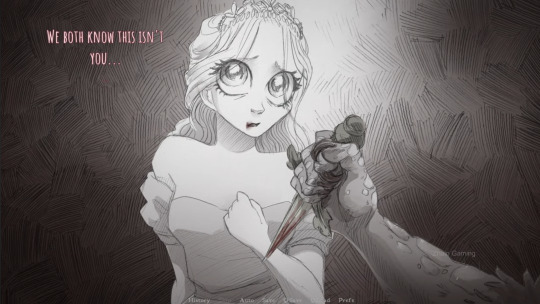
You resist the Narrator and warn the Princess, and she also notices and addresses the sudden shift in motivation. She then takes the blade, and uses it haplessly against you in self defense. Such is this end of Chapter 1; everything goes dark, and you die.
!!! CHAPTER 2+ SPOILERS BEGIN HERE !!!
[pt: !!! Chapter 2+ spoilers begin here !!!]
Chapter 2 is titled "The Damsel". When everything loads, you're back where you were before- the Narrator doesn't seem to remember you or what happened, but you and the Hero clearly do.
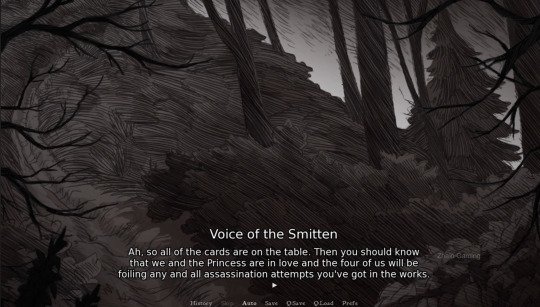
Not only that, but another character has joined the mix since your supposed death- The Voice of the Smitten loudly proclaims his love for the Princess and hatred for the Narrator. Plus, he says something unique- he mentioned "the four of us" foiling the Narrator's "assassination attempts". This four includes the Princess, the Smitten, the Hero, and the Host/player, establishing how everyone here perceives the others as separate entities. Plus, now that naming consistency with the others established, the Narrator, not labeled as a "voice", starts to stand out as something... Different, from the rest of you all.
But it's not just you that's changed; everything within the cabin looks different, and it's not only that.
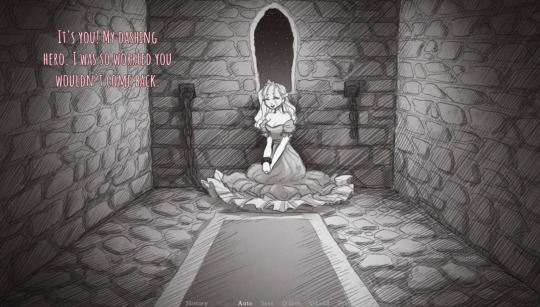
The Princess has metamorphosized; the Damsel wears a new dress and crown, has a much more gentle and delicate disposition, and her voice sounds significantly higher pitched and kinder. Not only that, but her bone structure is physically thinner, as is addressed later in the route. She has inarguably become different in not only personality but appearance too. Additionally, while she recognizes you and your earlier confrontation, she uses the pronoun "I" to refer to both herself as the Damsel and herself as the Princess before. This is indicative of monoconscious systems, where members share an individual consciousness/train of thought and switching involves the feeling of one member "becoming" another in a smooth transition, and median systems, where members often feel like facets of an overarching identity rather than completely separate entities. We see more evidence to medianhood after the two of you escape, and the Damsel seems to be taken away by... Something. You find yourself presented with the Entity holding her gingerly.
"Something finds me in the Long Quiet and brings me the gift of a fragile vessel."
She cradles her and describes the vessels as "nerves and fibers to feel the worlds beyond. Perspectives to make my own", and the Damsel as "soft and delicate. You molded her to love you, and she'll make for a gentle heart." She words it as if they are the same, and yet different at the same time. You ask if she is the Princess, and she says this;
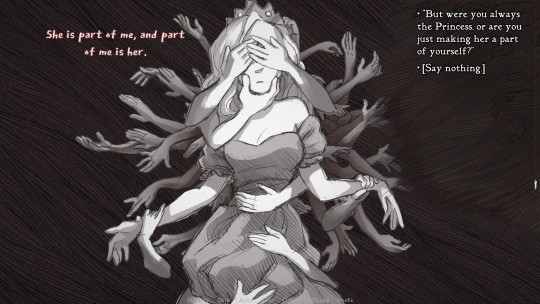
upon pressuring, she states that you're speaking in circles. "Does it matter where one thing begins and another ends?" This once again supports the fluid concept of median plurality. She is different, and yet she is the same. It's hard to tell the lines between one and the other, even though they both still distinctly exist. She asks you to "bring [her] more perspectives so [she] may be whole", wishing for the facets of herself to be returned to her via completing different routes of the game. Interestingly enough, it seems the Entity displays polyconsciousness during these segments, unlike the in-loop Princesses. In another route she mentions the Princess having a will pushing against her own, and at the end of your conversation she mentions one last thing;
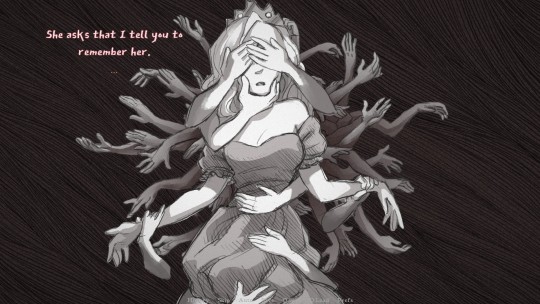
You're flung back to the beginning, with only the Hero and the Narrator at your side, and not a single memory ingame of what happened. You can't re-access old routes, so you have to choose to do something different the next time, to bring different parts of herself home to her.
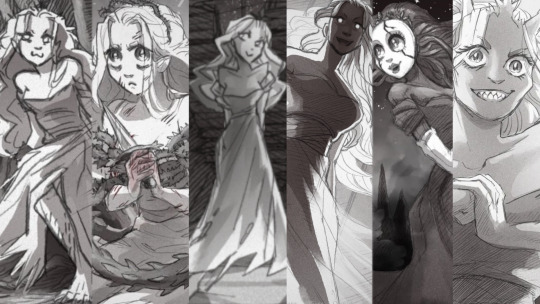
There are many different routes you can end up on, and the Princess will change in many different ways depending on your decisions. Let's go over some interesting notes on how the two's plurality presents over the course of the time loops.
- The Princess seems to be completely monoconscious when within the loops, sometimes acknowledging herself as different but never referring to her other facets as a separate perspective ("I/me", never "she" like the Entity refers to her vessels.) This rule is only broken by the Stranger route whom, where due to the world literally fracturing, had multiple perspectives shoved into a single one, and she refers to herselves as "we".
- The origin of new facets of the Princess seems to correlate directly with the reset of the world they're in, and we never see her looping forms change otherwise, meaning we can likely assume this to be their origin. While time loops aren't recorded to have happened in this universe, we can safely attribute some sort of metagenic origin to the Princess's median facets. The only other time we see her "change" other than after a reset is her disposition & voice upon the first time meeting her, depending on whether or not we take the pristine blade. This displays that the player character's actions directly affect the Princess's facets as well, however delving into that would get into endgame spoilers, so it'll be touched on in part 2.
- Due to the lack of evident amnesia, distress, or disorder expressed to be caused by her plurality (aside from the Stranger) it's safe to assume the Princess falls under the category of systems/plurals without a dissociative disorder such as DID, P-DID, OSDD1, and UDD.
- On the flipside, the Player's system shows quite a lot of distress and disorder, from the Broken and the Smitten attempting to kill the body to the Cold eager to harm it, as well as many different system members with specific jobs meant to help counteract or ease the negative circumstances of the previous loop. Additionally, during the Moment of Clarity chapter, the Host explicitly experiences amnesia of traumatic memories the other members remember everyone experiencing, displaying dissociative amnesia. It's likely this system falls under the category of plurals with a dissociative disorder such as DID, P-DID, OSDD1, and UDD.

- Many speculate the members of the Player character's system to be your past lives or iterations of you after your death, since for the most part, a new one appears every time the body dies. This would be known as a fenigenic/phoenigenic origin. However, there are a couple instances where this theory falls apart- for example, in the No Way Out route, the Player, Hero, Narrator, and Cheated are joined by both the Voice of the Contrarian and the Voice of the Broken at the same time; right after, the Hero states that this is your third time, meaning if the past life theory is true, there should be only two new members, not three. (The line between alive and dead gets fuzzy later in the route, but this one is cut and dry.) Instead, I propose the Player's system to be an adaptive system, ending up with new members whenever they must adapt their mindset drastically to the situation. The new members often tend to be a reflection of the body's actions during the last loop, which supports this concept as well.
- Routes such as No Way Out and The Adversary complicate these assessments. In No Way Out, every time you die you try something different, which results in a new system member every time. In The Adversary, you fight over and over again with the same determination, and The Stubborn remains as the only new member from the beginning the entire time. However, in both of these routes, the Princess stops changing form at all. Evidence once again shows itself that the Player Character's perception not only affects what the Princess will be, but what the results of his own changes will be as well.
- Another differentiation between you, the "voices", and the Narrator, aside from his lack of memory between loops and insistence that he's not the same person as other versions of him, is how they both treat and experience the Mirror. The Narrator is notably distinct in that he cannot see it during regular gameplay, and that once the world is replaced with it at the end of a route, he's no longer existent to perceive it. The ones labeled "voices" are able to see it and fear it instinctively- while they're different from the Narrator, even they disappear when you look in the mirror and speak to the Entity. Hypothetically, this could mean that you are to the Voices' perspectives as the Entity is to the Princess's. The Entity mentions that nothing but you and her come to the space where you speak.
- Upon meeting the Entity after the third time you bring her a vessel, she greets you with this line; "I am a growing chorus of contradiction. A mass of tides ebbing and flowing all at once in more directions than my attention can bear to hold. To look at any one is to shift them all into something new, and to look away is to reshape them yet again. All of me is changing, and yet the rest is still the same." This is an interesting perspective into her relationship with the vessels and how her overarching identity is affected by her medianhood.
- A case that deserves special mentioning is the route of the Spectre, after killing the Princess without hesitation in chapter 1 and then proceeding to kill yourself after. In Chapter 2, you're then presented with the option to let the Spectre possess you temporarily, giving her not only access to your body, but to your mind. For a brief while, she can hear and interact with all the others currently present with you- at the time, the Narrator, the Voice of the Hero, and the Voice of the Cold. Once she's within you, the Narrator can't even get out a full sentence before she comments, "So this is what it's like to be you, huh? Disembodied voice narrating your every move?" She addresses the Voices differently than the Narrator; "All these shards of broken glass on the floor... Are they also supposed to be you?" The Hero takes initial offense at this, saying that "I'm me, is what I am." The conversation continues to the Hero questioning the Narrator's existence, to which he responds, "You don't need to know what I am. You just need to know that I'm different than you. More important."
To this, the Princess answers, "So you're the one that pulled the strings and made me dead. I can tell you don't belong here. You're barely even there. Like the shape of something left behind. You're more of a... Memory, than a person." And then, "You're kind of like me, actually." What does she mean by that? Is he like a ghost? Something else? It'll be addressed in part 2, but clearly he's different from the rest.
- One of the most affirming dialogue options you can have with the Entity is after the fourth time you bring a Vessel to her, where you both speak about how your systems operate. You can ask her, "When you send me back, I'm not alone. There are voices that speak to me. Some of them are me, but one of them is something else. I call him The Narrator, and he wants me to kill you. Do you have a Narrator? Have the Vessels had one?" This is yet another hint that the Narrator is fundamentally different than the rest of the Player's system, making it clear that together they make up a mixed origin system. In response to your question, the Entity responds with this:

From this we get a few things. For one, the Princesses are referred to in the plural sense ("their minds"), enforcing the separation between them. However, she goes on to describe them existing and constantly metamorphosising into something new, basically confirming the concept of monoconsciousness within the Princesses themselves.
....
From all this, we've drawn a lot of conclusions about the plurality of the Player character and the Princess/Entity from Slay the Princess! Such depth of plural experiences is extremely rare in any media, and this one exemplifies it very well, balancing both personhood and parts-based conceptualizations in its depiction. In part 2 we'll go over how the endgame and its philosophy applies to these concepts, as well as the revelations about the characters involved. It's wonderful to have such vibrant and unique plural representation in a video game; thank you for reading this disambiguation!
#slay the princess#stp princess#stp analysis#pluralgang#plural community#plurality#plural system#system community#pluralpunk#plural headcanons#stp the princess#stp the long quiet#stp the hero#the narrator stp#the shifting mound#the long quiet#media analysis#character analysis#slay the princess analysis#adaptive system#monoconscious#mixed origin system#sysmeds dni#exclusionists dni#didosdd#did osdd#disordered system
253 notes
·
View notes
Text
Tis a niche of its own
Sorry there is only two female characters, I kinda pulled these off the top of my head and probably missed a ton of other candidates. Reblog with an addition if you have one!
Edit: I forgot to make this poll a week long! Once this poll ends I'll remake it with new additions depending on the results (the characters with the fewest results will be replaced with suggested characters from the notes so be sure to suggest some!) in the meantime tho plz reblog to increase sample size
This follows my own definition of what "Comic Relief" means: A character that is used as a conduit for comedy in a piece of media
Through character studies I have determined that there are 5 types of comic relief: the Character Relief, the Audience Relief, the Tone Shifter, the Butt of the Joke, and the Slapstick. Characters that identify as "Comic Relief" usually fall into one or more of these categories
Further explanation under the cut
The Character Relief refers to a character who actively makes jokes to be funny in-universe through conscious humor. Examples from this poll would be Sans and Rayla, who go out of their way to make their friends laugh
The Audience Relief refers to a character who makes the audience laugh regardless of their impact on the story. Examples from this poll would be Lapis and Gus, who are often involved in comedic bits meant for audience entertainment that aren't acknowledged by the narrative as anything unprecedented
The Tone Shifter refers to a character who makes jokes to relieve tension and shift the tone of a scene, either consciously or unconsciously. Examples from this poll would be Jay and Leo, as they both consciously make jokes about grim situations to help their friends or family feel better. Additionally, Jay would do this unconsciously before his trauma made him start doing it on purpose
The Butt of the Joke refers to a character who is made fun of by other characters in-universe, whether endearingly or not. Examples from this poll would be Dewey and Lance, who are often met with insults whenever they do something wrong or silly. The insults are usually meant to be endearing and comedic, but they can still feed into the character's possible inferiority complex. This also applies whenever a villain hits them with a sick burn*
The Slapstick refers to a character who is made fun of by the narrative and the audience like a punching bag. Examples from this poll would be Sokka and Yusuke, who are sometimes put in troubling and awkward situations as a gag for the audience's entertainment alone. These gags are not fun for the characters yet delightful to watch
Most comic relief characters can be characterized as multiples of these. For example, Jar-Jar from Star Wars is both Slapstick and Audience Relief, and even if you don't find his jokes funny that doesn't change the fact that they were written with your entertainment in mind
If you're curious how a "The Narrative's Favorite (derogatory)" character would fit into this chart, they're likely both a Butt of the Joke and a Slapstick character, making their life absolute hell. To be honest, MK from Monkie Kid is an example of a character who fits all 5 categories, but he isn't blue so he isn't in this poll
*Ok if you've ever seen Phineas and Ferb Mission Marvel let me just say MODOK is a total Butt of the Joke and my favorite line in that special is when a TV announcer calls him a "Giant Chicken Egg with a Face" and I just had to mention that omg
#I wanted to put Aqua from Kingdom Hearts but she's technically not a comic relief character#I did initially put Phoenix Wright down but ultimately decided Lapis needed a shoutout#Phoenix is both Butt of the Joke and Slapstick. no wonder he's traumatized#polls#comic relief#character analysis#atla#atla sokka#ninjago#jay walker#voltron#vld lance#ducktales#dewey duck#sonic the hedgehog#the owl house#gus porter#undertale#sans undertale#the dragon prince#tdp rayla#persona 5#yusuke kitagawa#rottmnt#rottmnt leo#steven universe#lapis lazuli#ok ko#ok ko let's be heroes#omg im out of tags
182 notes
·
View notes
Text
Let Kel Be Sad: An Analysis on Kel’s struggles to express his negative emotions
Like Hero, Kel is also a “fixer”—he would bend over backwards to solve his friends' problems and stop the world if it would make them happy again, and both him and his brother are such big hearted and generous people who would much rather be the emotional support for others rather than talk about their own problems and make a situation about themselves and their feelings. For Hero, this often involves burying his own feelings and faking happiness, but I don’t think it necessarily means this for Kel, even if he struggles to express his negative emotions.
To me, Kel’s happiness and positivity is genuine, but he dismisses, discounts, and often runs from his sadness when he does experience it.
Let's discuss under the cut.
[Mod Sprinkles made the joke that in another universe I (mod Acacia) would also run a blog called "Let Kel Be Sad" so here are some Kel thoughts. Thanks for indulging my ramblings! 🧡]
Disclaimer: These are just my personal opinions, perceptions, and headcanons about Kel (and Hero). There are a lot of ways his character can be interpreted, and one of the great things about fandom is getting to see different points of view and differing interpretations of characters we all know and love. I know I speak for both Sprinkles and myself when I say we have a lot of respect for that, and for that reason, I want to be upfront that, while I do genuinely believe Kel struggles expressing negative emotions (thus the "Let Kel Be Sad" title), I don't personally view Kel as someone whose happiness is "fake" in the same way as Hero's. I can see the appeal of this interpretation and can understand why people interpret his character in this way, but it personally does not vibe with my personal interpretations, perceptions, and headcanons of Kel and his character, so if you perceive/headcanon Kel in that way, this post probably won't be your cup of tea. Please keep that in mind.
Warnings: OMORI Spoilers and discussion of game-relevant heavier topics such death, trauma, and grief.
Kel wears his heart on his sleeve, but this doesn't mean that he is shallow. He is a big-hearted, deeply empathetic, and incredibly loyal friend, and it cannot be stated enough that one of Kel’s biggest strengths is his ability to use his natural positivity and resilience to lift up those around him. He’s really the hero of the game because none of the healing would have been possible if he hadn’t continued to believe in his friends even after all of this time, hadn’t encouraged them, and hadn’t built them up just by being Kel.
And while I do think Kel does struggle to express vulnerabilities and negative emotions, I don't personally think of Kel's unwavering optimism as a mask. In my mind, Kel is not an emotional repressor or burier in the same way as Hero. In fact, because he wears his heart on his sleeve, he would probably really struggle to fake an emotion he wasn’t feeling (even if it was something positive like happiness). If Kel doesn’t want to express an emotion, I imagine he runs from it and avoids it, since it’s not natural or easy for him to “replace” or “bury” it with a fake one. Whereas Hero is much more reserved and private about his feelings, no matter what they are, so it’s much easier for him to convincingly mask pain and suffering under layers and layers of fake happiness. I just don’t think Kel would be able to hold back those emotions for very long. His negative feelings would eventually just kind of explode out of him without thinking and/or they’d become so apparent from his expressions and/or actions (since he does wear his heart on his sleeve) and everyone (including the player of the game) would know that he had so much negativity under the surface.
This isn't to say that Kel is perfectly fine. He isn't. He has suffered a terrible loss just like everyone else, but I think the game makes it clear that Kel has the most acceptance surrounding Mari's death and that he has made peace with what happened more so than the other main characters. Please keep in mind that this is only relative to the other main cast. Kel may seem "well-adjusted" in comparison to his brother and his friends who are, quite frankly, barely keeping it together, but he would not necessarily be considered well-adjusted in comparison to the non-traumatized townies. I genuinely believe that Kel is still in the process of healing, but relative to the other main cast members, he is farther along in that journey than they are.
And in that way, the game doesn't really give us a moment where Kel is overwhelmed by grief in the same way as the rest of the characters. Yes, there is the scene (one of my personal favorites) where Kel shares about his fight with Hero, and it is incredibly vulnerable and gives a lot of subtly and nuance to his character, but I don't think it's necessarily evidence that the player can't accept Kel as he presents himself to us at face value in the way that we can't accept Hero as he presents himself to us at face value. As I recently discussed in this post, the scene where Sunny finds Hero crying alone at Mari’s piano on the night of "Two Days Left" tells the player that Hero's attempts to appear well-adjusted and "fine" are, at least to a certain extent, all for show. There isn’t a Kel equivalent of this scene which, I personally think, is meant to tell the player of the game that Kel is the most well-adjusted member of his friend group (key words here being "of his friend group") and the one who has the most acceptance surrounding Mari’s death. Additionally, Mod Sprinkles actually made the point that Sunny is extremely perceptive and sensitive to his friends’ feelings and emotions. If Kel was still harboring a lot of negativity surrounding Mari’s death, Sunny likely would have picked up on that and been more hesitant to go outside with him in the first place.
This isn’t to say that Kel doesn’t ever have any negative feelings and that he doesn’t struggle to express those sometimes, but I think this struggle to express “the bad stuff” doesn’t stem from a pressure he feels to be happy all the time. That said, I do wonder sometimes if he is a little scared of feeling sad. He wants to be happy and wants everyone around him to be happy, and I think there is this certain helplessness that he feels when he can’t cheer other people up. We see a little glimpse of that in his account of his & Hero’s fight after Mari’s death. I think watching someone he loved so much go through such a deep and debilitating depression at such a young age probably permanently affected him, and he might have some worries about getting “stuck” like his brother, wallowing in that sadness and grief if he allows himself to feel it.
However, this is an unwarranted fear because Kel and Hero are very different. Even though Kel might feel sad, and his feelings are absolutely valid, I don’t think he’s prone to that level of despair and depression that we see in Hero. Understanding that his experiences and emotional responses are different than his brother’s is a big part of growing up so it might take him a while to realize this, and in the meantime, I could see it possibly manifesting itself as a sort of avoidance of sadness.
Everyone grieves differently. This is a difficult concept for even adults to understand, so I can't imagine how hard it would be for a 12-year-old like Kel. Because Kel didn't grieve Mari in the same way as Hero or his friends and didn’t spiral into the same level of despair and depression as the others, I think he struggles with invalidating his own feelings to himself sometimes--writing them off as shallow and dismissing them to himself as "just not deep enough." Again, I think this goes back to the one (1) fight that Kel and Hero had. We don’t know exactly what they said to each other in that fight, but it’s my personal headcanon that Hero lashed out at Kel for “not understanding” for he felt. From then on, I think Kel really does struggle with this fear that he just doesn’t understand emotions and because of that, any attempts to help his hurting loved ones will only make everything worse.
I’d really like to see him reach a place in which he can accept that even if his feelings and his grief are different and perhaps not as lingeringly overwhelming as the others', that doesn’t mean he doesn’t have them and that doesn’t mean he didn’t care about Mari or his friends. In my mind, Kel’s hesitation and worry at expressing his negative feelings and his happy-go-lucky personality can both exist at the same time. I don't think they are mutually exclusive, and I tend to think of Kel as someone who naturally looks on the bright side of things and is genuinely optimistic and uplifting. To deny this feels like a disservice to (my personal perception of) Kel, but I think it is also a disservice to pretend he never feels sadness or any negative feelings at all. There has to be a balance.
Let Kel feel sad when he needs to but recognize that he doesn’t actually need to feel sad all that often.
#kel omori#omori kel#omori hero#hero omori#omori#omori meta#omori analysis#kel character analysis#hero character analysis#(at least a little bit)#omori spoilers#thanks for reading#hero loves his brother so we can talk about him here too i think
56 notes
·
View notes
Text
Bruce is actually really attractive, and I have enough reasoning to make a list
He's:
Tall (. Tall enough to hit his head on the vault doorframe)
Long-legged
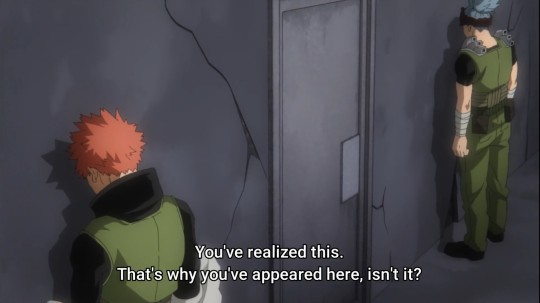

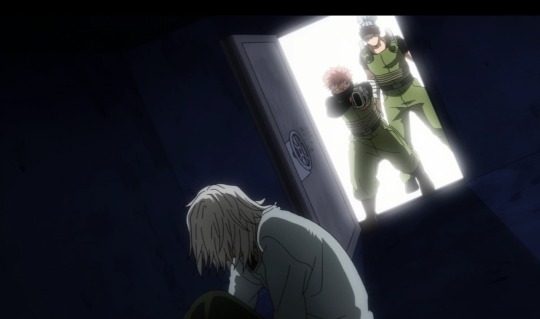
Has a straight nose bridge
Has high cheekbones (more noticeable in 2nd pic below)
Has a strong jawline
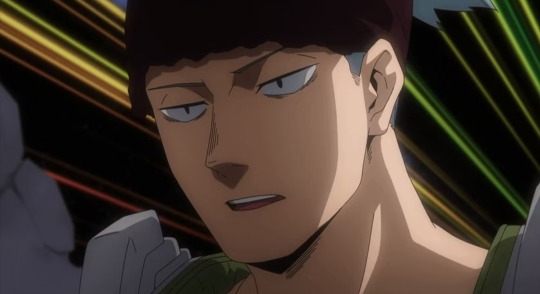
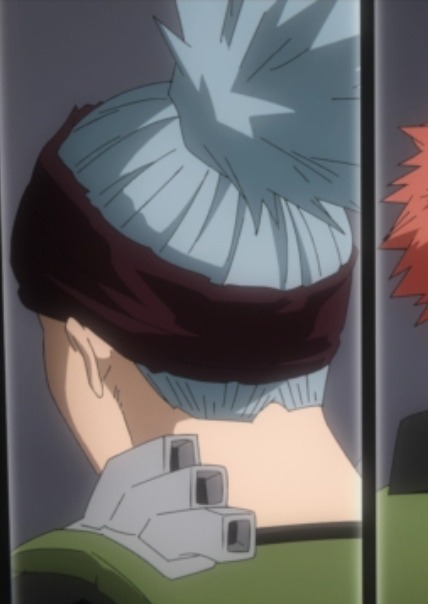
Sharp eyes, but they aren't small (plus eyebags if you're into that)
Overall, he has strong, attractive facial features
Has broad, refined shoulders. You can tell he works out (or he did, when he was alive)
Even has a thick, muscly neck
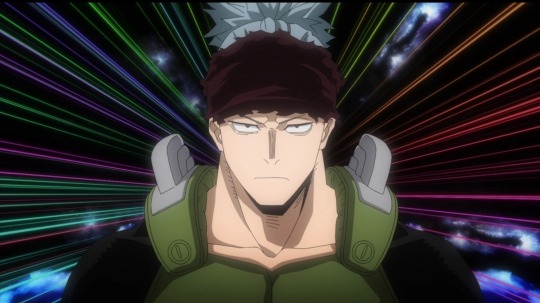
He has MUSCLE. Is SCULPTED. NOICE. VERY NOICE. (nice arms. Nice shoulders. Nice neck. Nice legs. Nice butt-)
(There are actually panels where you can see some of his muscles. Other than those already shown here, he's got bricky thighs-
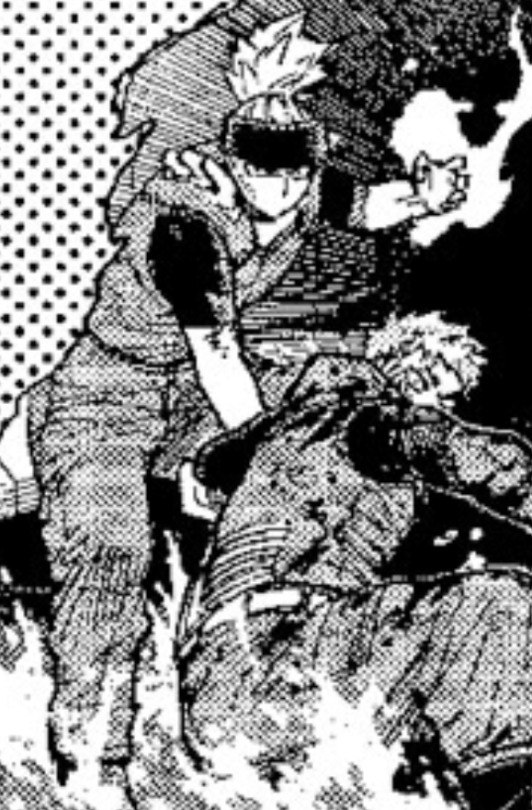
-and in the panels where we first get his name dropped, he's got those shoulder blades too-)
The one time we see him smile, and he actually has a scary one
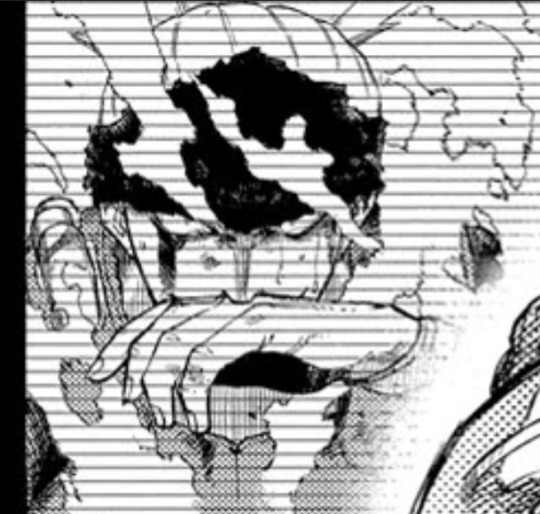
Has small, kinda sharp pupils, and his eyes remind me of a cat. We only ever saw him tense or defensive, so his resting/listening face is really cute
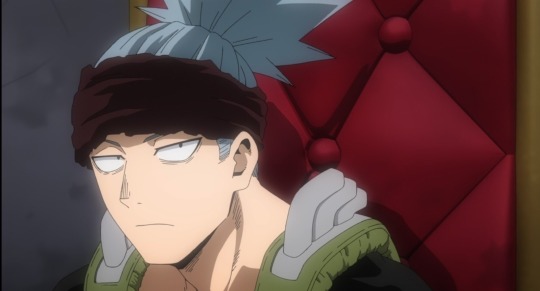
Other than the physical appearance stuff, he also:
Takes shit without batting an eye (patience, knowing it's just how Kudo is, etc)
Kudo being all "Cut the crap Bruce and give it to me straight", after Bruce tests his blood and is rightfully Concerned because they just faced AFO
Put up with Kudo's experimenting and testing over Yoichi's transferable Factor
Did ya'll see the look on Kudo's face when he realized he had Yoichi's Factor/will? Kudo was going to start in nonsense and Bruce just dealt with that.
Also something I noticed when looking back at the images here; Bruce has bandages on his arms in the void. But not when he faced AFO in the sewers.
Were he and Kudo cutting their arms open in their experimenting over Yoichi's theory? Is this why Kudo has two gauntlets instead of his one? Why we never see his bare arms in the void? That he always keeps his arms down so there's no slip?
Is smart enough to run blood tests, plus has enough common sense to pick Shinomori as his successor
He picked a guy who avoids society, has an Ability to detect danger so he can always stay away from AFO, is also a coward so he's never going to go throw himself into danger, even without knowing instinctively he stands no chance, etc.
Meanwhile, Kudo chose Bruce, who he played Hot Potato Yoichi with; but he did also trust Bruce, and put the only pure combative Ability in OFA through Bruce.
These two made their choices based on what they valued and saw the Factor needed.
Is logical, analytical, and calm.
He tried advising Midoriya on their Abilities in One For All, especially his own.
Midoriya then tried ignoring him about using Fa Jin for the first time, but found he was right, thinking: "Dammit!! I had [Lady Nagant] right where I wanted her, but... ugh! The Third was right. My parallel Quirk processes are all screwed up!" (ch. 314).
Plus, when Midoriya fixed his processing mistakes, Bruce was analyzing the way he reached his new conclusion. Pure facts, no bias, very calm, just saying it as it was.
We never see him panic. When he's caught by surprise in the sewers by AFO, Kudo, and Yoichi's little bubble event, he immediately reacts. He doesn't falter, he just knows he has to do something right now.
Was more willing to listen than Kudo to Yoichi's beckon, and probably was just following Kudo's rejection of Midoriya
While we don't see Kudo's face, we see Bruce's eyes when Yoichi calls on his heroes. Bruce was more open and receptive, or at least more impacted.
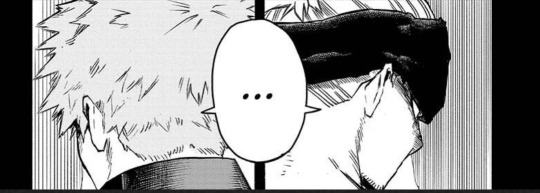
Bruce was also the one to start talking, while Kudo just kept quiet.
He actually communicates a lot
When Yoichi called them to support Midoriya, Bruce started talking to paint a picture of why they thought the way they did, so Yoichi understood where they were coming from.
(Though he seems to beat about the bush sometimes, since Kudo spoke up to be direct on how they couldn't just put their trust in some starry-eyed teenager. Plus, when Kudo tells him to just tell him what's wrong [double Factors])
When Midoriya first used Fa Jin against Nagant, Bruce came out just to tell him he knew what he was trying, but that Midoriya wasn't ready; and Midoriya found he was right. Midoriya just didn't want to listen to him then.
He asks Kudo for clarification after finding Kudo had two Factors in him after the sewer incident ("Just to be sure, All For One didn't touch you, right?") Kudo knew him well enough to go "stop beating around the bush and tell me", so Bruce was probably gonna start with questions, theories, and trying to understand everything in general, before saying "yeah you have two Factors. Don't know why".
Is strong-willed and loyal.
He followed Kudo, even to death, carrying on the cause he started until it ended with him.
Plus, when talking about how AFO needs a strong will to override OFA's own, we first see Bruce, Kudo, and Yoichi.
AFO couldn't steal OFA because the will was too strong for him, and that was back during Banjo's time. Since Shinomori never actually tried opposing AFO and just hid, we can assume the first Three (Yoichi, Kudo, Bruce) already had an accumulation of strong willpower that made OFA un-stealable. Those three are a strong enough foundation, and the main wills, that the other users just become bonuses.
Kudo, also saying that Midoriya needs allies with the same will and drive as him... hey Kudo, you're talking about yourself and your old allies, aren't you? That's why you look at Yoichi and Bruce when you say this.
Not only is Bruce attractive, but he's got good character. THE END.
#yes this is a bruce appreciation post#am i biased? yes. am i right that he has these features? also yes.#hes actually a very attractive person. hes got all the right features for it#plus hes smart (some medical knowledge) is really loyal strong-willed and patient#he puts up with kudo SO much#from being bossed around to taking home yoichis brother to whatever the heck kudo made him do to figure out OFA's transfer properties.....#i didnt think much of bruce originally#then i started doing resistance fic stuff and now hes a fave#hes a little blorbo#that i throw in terrible situations for my own entertainment#used his scary smile for comedy purposes#like when he made a kid cry once. or when a meta child was afraid of him so they bit him#has patience to deal with kudo and co. but also. has enough bite to snark them. is how i like writing him#oh? background character? well lemme just *picks him up* EXPAND ON THAT-#fic stuff: he tries making a good impression on a girl and kudo is ruining it immediately#he doesnt know what to do because the two always banter#kudo: fuck you#oc: fuck me yourself you coward#he sees through a rose-lens that kudo is trying to rip off his face#appeciation kinda turned analysis in general#bruce#kudo#yoichi shigaraki#bnha#mha#spoilers#boku no hero academia#my hero academia#NOT YOICHIS BROTHER. i meant Yoichi / AFO's brother in a prev tag up there but theres too much tags i dont wanna rewrite to fix that#(image limit and tag limit)
157 notes
·
View notes
Text
Behind the locked door
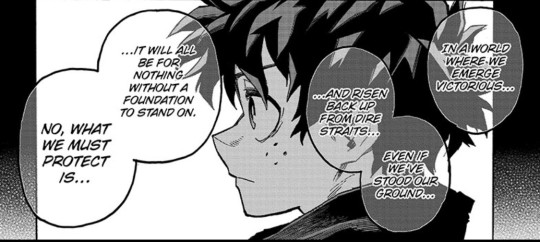
In honor of Izuku’s mask disintegrating into rubble, I think it’s finally time for me to really dig deep into his character. I’ve been keeping this one in my back pocket for a while. Amid all the talk about Izuku’s fading narration, the “control your heart” subplot, I’ve been trying to find the words to articulate how I know exactly where this is going, at least on a certain level. Most recently, I read this meta from pika who brings up how the word “control” alone can be misconstrued (by us). And then I thought about how a while back I made a similar point, although I said Izuku was the one who got it wrong. At that time, I was holding back a huge piece of evidence because it was external to the story and I wasn’t sure it would be received well. As a result, my argument fell a little flat. Well, now—after 411, right before leaks for 412—it might be my last chance to play this card.
So about that external evidence. I struggle to bring it up because it’s gonna sound an awful lot like I’m projecting onto Izuku if I don’t do it justice. But… I look at the way his storyline has been going lately and I see a pattern emerging that I’m very familiar with. Fortunately, I don’t have to dump a bunch of personal junk on you in order to illustrate this pattern, because a certain personality typing system already has it all figured out: the Enneagram.
Now, hang on. I’m not one to put people in boxes. My trans ass? I managed to get a different result every time I retook the P0ttermore quiz. MBTI, zodiacs—not my thing. But the Enneagram comes the closest I’ve ever seen to covering all the bases and revealing actually meaningful insight, at least for myself. On top of that, I find it extremely useful for fleshing out fictional characters, hence this post will be taking advantage of that.
For those who aren’t familiar with it, here’s a quick overview: The Enneagram consists of 9 individual personality types, each arranged carefully in a sequential, circular manner. They are also simply named 1 through 9. While this might seem kinda basic, there is actually a surprising amount of nuance and fluidity involved. Typing is done largely through personal introspection (you don’t really have to take a test). Adjacent numbers share some core themes with each other, and according to a web of arrows between them, one type can take on either positive or negative traits associated with other types depending on how emotionally ‘healthy’ they are, causing a lengthy spectrum of different ways each type can manifest. That part gets kinda complicated to explain here, so for more info, the Enneagram Institute website is a decent place to start. I also highly recommend the Enneagram album by Sleeping At Last (and if you really want to dedicate some time, the accompanying podcast) to really get inside the heads of the types on a deeper level.
My interest in applying the Enneagram to Izuku comes from observing how differently one can interpret his character based on whether you read him as a 2 or a 9. And even though no one uses this language to talk about him, the distinction accounts for a bunch of different rifts in the fandom: whether you appreciate bkdk’s relationship, whether you can acknowledge Izuku’s flaws and weaknesses, the severity of his vigilante/rogue phase, and most importantly the gravity of his concealed heart, his rage, and what it all means—what he needs in order to grow and triumph.
Discussion of Enneagram types in the fandom is pretty scarce, but where it exists, I have only seen him labeled as a 2. Type 9 and type 2 can be similar at a glance in a lot of ways (actually, 9s can be mistaken for any type because they are like all of them combined). It’s easy to see Izuku as a 2 because he is the helping hero archetype. He puts others’ needs above his own and he is always ready and eager to help. If you listen to Sleeping At Last’s song for 2, you’ll notice that it’s all about care and noble sacrifice with the underlying theme of neglecting or even harming oneself: “I just want to build you up, until your good as new, and maybe one day I will get around to fixing myself too.” Sounds pretty obvious, right? Well, here’s the thing. You really get to know what your type is by how it hits you where it hurts, so I like to focus on each type’s basic fear and basic desire, first and foremost, as a tell. A 2′s basic fear is of being worthless and unloved. Consequently, their most basic desire is to be loved. And 2s have been taught through their negative experiences that love is conditional, something they have to earn from others. They need to be needed. So let’s say you think Izuku is a 2. This means you consider his heroic, self-sacrificing tendencies to be a result of his growing up quirkless and being told he is worthless and powerless because of it. Through this lens, he is trying to prove himself to the world by being useful. Along these lines, you may also assume he is trying to prove himself to Katsuki. Taking this train of thought even further, you may interpret Izuku’s relationship with Katsuki as an obsession of his, where he is either blind to Katsuki’s more negative traits in favor of gaining his love and praise, or else bitterly determined to prove him wrong. This is how a 2 might behave in an unhealthy relationship with an 8, which, yes, I do think Katsuki is an 8. That’s a tangent for another time, though.
But does Izuku ever “need to be needed?” It’s worth noting that while 2s’ search for validation might seem insincere, it is actually motivated by a deep, heartbreaking insecurity. They think they don’t even deserve love unless they are useful to someone, so they do everything they can to be worthy. Does Izuku show signs of this motivation?
If I stop to think about it, I can’t exactly see this in Izuku’s character. Yeah, his dream is to be a hero, and in his childhood, he was denied that dream. However I think we need to take a step back from that for a second if we want to dig deep. I mean, a lot of the other characters also behave heroically, act selflessly, and strive to help. Does that mean all of them are 2s as well? Of course not. So let’s instead turn to observe how Izuku acts with his loved ones, friends, and peers in other/adjacent contexts:
Inko: He is committed to protecting his mother from fearing for his safety. He wants to be good enough to not cause her to worry, rather than good enough to make her proud or make her love him. Idk about his father but at this point I think it’s safe to assume he is deeply unimportant.
All Might: I would describe their relationship as one of mutual responsibility. Izuku feels a responsibility to uphold All Might’s legacy, All Might feels a responsibility to teach him well. Because of this mutuality, I don’t think it quite makes sense to say Izuku deliberately seeks approval for its own sake. You know what I mean? They may be a mentor and a pupil but in practice they are almost more like co-conspirators. They don’t really have a power dynamic going on.
Shouto, Tenya, other friends: Izuku seems to take an interest in what makes his friends tick, and he sets himself aside in order to both analytically and intuitively determine what’s wrong and how to solve it. Examples include his fight against Shouto in the sports festival, and his stubborn concern for Tenya’s reaction to his brother’s forced retirement. He will put himself in the line of fire specifically when confronted with another person’s inner demons. This is not a labor that is asked of professional heroes, it’s just who Izuku is. You can also extend this observation to how he sees through Tomura to Tenko, but I’ll get to that later. Basically, while 2s seek to help in all kinds of ways, a 9’s strategy is always centered on the realm of the mind.
Kota: Adjacent to the paragraph above, before Izuku literally gets into a position where he needs to save Kota, he becomes interested in the boy’s point of view out of genuine curiosity. He doesn’t go “oh no, this kid doesn’t like heroes, I better get him to like heroes.” Instead he seeks out information as to why he thinks that way, and patiently listens. He’s sorry about what happened to Kota, and he understands. Twice (ch 71 and 72), he recognizes the fact that everyone has their own point of view on quirks, and he can’t really do anything about that.
Mirio: This might be one of the most telling examples. Mirio is the platonic ideal of an All Might successor. He’s “perfect.” He even looks the part. While this initially makes Izuku uncomfortable, he doesn’t become insecure and defensive over it. On the contrary, he easily comes to the conclusion that actually, Mirio should have One for All. Just like that (ch 172). If Mirio hadn’t dismissed the “hypothetical,” he probably would have gone through with giving it to him. That’s not how a 2 would respond. A 2 would double down and aim to be better than Mirio by trying to establish some relationship of need, fueled by the insecurity. Their shared subplot with Eri would have looked pretty different, I think.
Katsuki: I’ve mentioned before that I believe their rivalry only exists because Katsuki put it there. First of all, we can see that after the sludge villain incident, Izuku weirdly takes Katsuki’s dismissal of Izuku’s help as practical advice. Like, “oh yeah, I guess what I did was pretty stupid and dangerous, and I’m not cut out for this hero stuff. Now I can move on and find a realistic career.” Hello?? He accepted that so easily. So Izuku clearly isn’t motivated by a desire to prove himself to Katsuki. Even when he proclaims he’s going to surpass him, it’s like he’s happily mimicking Katsuki, not reacting based on insecurity or pride. Izuku is content to meet Katsuki wherever he is, and he’s satisfied with whatever kind of relationship they are able to have, including a rivalry, so he isn’t vying for his affection either. We can observe this when he gives up the role of reaching out a hand to save Katsuki to Kirishima, and also when he thinks about how “blessed” he is to even have a normal conversation with Katsuki. He doesn’t push things. It’s also stated in Deku vs. Kacchan 2 that Izuku doesn’t excuse or overlook Katsuki’s “bad side” but still admires him for his other traits. This is not at all characteristic of a toxic 2x8 relationship.
When 2s are at their very worst or pushed into unhealthy situations, they tend to become more needy and self-centered, even downright manipulative. But at Izuku’s worst, when he went rogue, he pushed everyone away to avoid being a burden. When the refugees at UA tried to prevent him from returning, he was like, “you’re right” and would have turned back immediately if not for his friends, loved ones, and other people who care about him telling him it was all okay. Meanwhile, Katsuki, in true 8 fashion, was pissed off at being rejected and having to deal with Izuku’s stubborn and evasive side (oh yeah, have I mentioned 9s are actually stubborn as hell?), but he made sure to establish that they are (he is) here to step in when Izuku can’t handle things by himself. Katsuki even opened up and admitted to his own weaknesses to show why mutual support is so important. Tbh, a lot of the above can be construed as just super healthy type 2 behavior, but not this. The way Izuku acts at his lowest, and his dynamic with Katsuki? Totally different. Dead giveaway for a 9.
Let’s get into the type 9 itself in more detail to show how it applies to Izuku more deeply—seriously, it’s beat for beat. One of the key differences is, while 2s seek validation, 9s are actually resigned to the belief that they aren’t important. Similar to 2s, a 9′s basic fear is of separation, but their basic desire is actually just peace or harmony rather than love. Notice how these motivations are just like a 2’s, except they have the “self” part taken out. With that in mind, they “achieve” their basic desire through selflessness in and of itself, without the need for recognition. That’s not to say that 9s are better than 2s. In fact, a 9 can be worse, in a way. If unhealthy, they will seek peace at almost any cost to themselves. In other words, they can be more self-destructive while still under the impression that they are doing just fine. “Peace” may refer to the expression of empathy, fulfilling the needs of others, sheltering someone, or mediating a fight—but also to repressing their own opinions and needs, not “rocking the boat,” ignoring negative emotions, or becoming a vessel for someone else to vent to.
What about inner peace? 9s value serenity, and thus they have a complicated relationship with the most tumultuous of emotions: anger. On the surface, 9s look like the type that is extremely slow to anger and highly tolerant. However, as much as they would like to believe this about themselves too, deep down, 9s are afraid of what might happen if they lose control. My phrase for it is this: I feel like a bottled tornado. Personally, I also think of anger as a basic desire to make others feel your pain—not necessarily sadistically, but in an effort to be known, to be understood. The difficult thing to grasp, especially for a 9, is that this is NOT inherently a bad thing. It isn’t wrong to seek sympathy. On the contrary, it is harmful to tell yourself that getting angry is wrong, because it’s like telling yourself that your pain is wrong, your pain doesn’t matter.
The problem is it doesn’t stop there. A 9, in shutting down their anger, ends up with such a low opinion of their own heart, their other emotions dull along with it. They cry less, laugh less, love less. It’s often said that they “fall asleep” to themselves. It all starts with anger. It’s interesting to note how different this whole mindset is from toxic masculinity—where men only feel allowed/able to express emotions through anger. This is sorta like the opposite. Anger becomes the dam rather than the river. For Izuku, I want us to consider that his suppression of anger carries with it the implication that he is hiding other things, too. It’s a given. There’s a whole sea of feelings out there, and we can only see the waves hitting the shore.
This brings me to the whole “control your heart” thing. I do think it is worth mentioning that Banjou didn’t just tell Izuku to exercise control. He also told him that his anger could be useful if it is harnessed. With this added context, “control” here means “to master.” And Izuku seemed to grasp this concept… sorta. I think that if Izuku is like a 9, we can assume he has trouble understanding how anger could be a worthy source of strength. His emotions in relation to Katsuki feel more like a weakness to him, a character flaw in a hero, who is supposed to be detached and selfless. But he’s trying to understand, even though he’s afraid of it. He essentially applied the same strategy he used for mastering OFA itself: incremental strength training. Which, okay. Take a moment to absorb how odd that is, in relation to emotions, specifically. Does one learn to cry incrementally? Does one learn to use anger by bottling a fucking tornado?? Like, what, you think you’re gonna be able to let out juuust the right amount of air to avoid an explosion??? No, man… if you want to be the master of your emotions you have to be willing to sit with them. Confront them. Listen to them. Take them in completely and accept them as a part of yourself.
For someone like Izuku, though, it is very difficult to imagine how this is even possible. Tomura, as with every villain, can be used to reflect his hero counterpart’s greatest fear about himself. Tomura literally touches everyone and everything with his rage, and as a physical manifestation of that desire to pass his own pain onto others, destruction radiates from his fingertips. Thus, losing control in this manner must be Izuku’s worst nightmare, as if he would be completely unable to stop the collateral damage like an infinite line of dominoes. But his anger is not something he can overcome, as such.
An overarching theme in this heroes vs. villains conflict is that the villains are not merely obstacles to be overcome. Just think back to Himiko’s bitter rejection of the heroic sense of superiority. She demanded not to be pitied, condescended to, or lied to. Likewise, the answer cannot be that Izuku needs to restrain himself where Tomura doesn’t. What purpose would it serve to show that Izuku is better than him? Certainly not saving Tomura. If this was a battle against AFO, it might have been a different story. In that case, Izuku would have to overcome his emotional manipulation tactics. Tomura, on the other hand, is not so strategic. With his strangely childlike tendencies, he must relish making Izuku mad because it brings them closer to the same wavelength. It’s his own twisted way or seeking sympathy, or at least, the closest thing to sympathy he can get anymore, because he believes he is beyond saving. With that in mind, Izuku isn’t going to get anywhere unless he rises to meet him. Izuku has to match Tomura’s hatred with equally strong emotions of his own, whatever they may be, or else face the loss of OFA (as established in 305). This is not an easy thing to ask of a 9, once they have started to pull the blood from their extremities, become cold and numb. Bringing back circulation is painful and makes the skin crawl.
In case you’re worried about the focus on anger here, I want to reiterate that concealed anger in a 9 is just one sign of so much more. Back when everyone started fretting about Izuku’s habit of self-sacrifice, which would have been the only thing we need to worry about if he were a 2, I was freaking out because Izuku was also starting to look like a person who has too many secrets. You don’t even have to acknowledge the possibility that he lied about what triggered blackwhip. It’s written all over his face all the time these days. It’s especially noticeable when you contrast him with Katsuki after all his own growth. Katsuki confides in people. He acknowledges his weaknesses. He enjoys being himself. He asserts his place. He thinks about Izuku all the damn time and now he even lets himself be soft about it. All this warmth while Izuku is distant, muted, and blank. I know all too well what this state of mind is like. Man, I hate secrets. You get to the point where you don’t know how to talk about even the simplest most inconsequential shit. And the bigger things? They’re like a growing snowball of words in your throat that cannot possibly fit out of your mouth. The “easiest” way to cope is to simply fade into the rhythm of life. Go with the flow.
Since 9s have a natural curiosity about the interiority of other people, they may choose to focus on that in order to divert their own attention away from themselves. Taken to the extreme, they will lose track of their sense of self. Like I said, you can see Izuku doing this as he fights, analyzing the psyche of his opponent, and his match against Shouto in the sports festival was a fantastic early example. They became friends because of how observant Izuku is. His emotional intelligence and intuition are very strong, but gradually, as he has taken on greater responsibilities and experienced more trauma, he has gotten worse at applying these skills to himself. You know, we go on and on about how his narration has been reduced to nearly nothing, and it’s not just an absence of introspection, it’s an absence of self. It creates a lack of ownership over the narrative—what should be his narrative.
Right now, he’s focusing on trying to see Tomura as a person, figuring him out. I think it would be really satisfyingly ironic if in the process, he ends up uncovering insights about himself instead. It’s about time we learn what Izuku’s secrets are. I don’t actually think that Izuku mastering anger will constitute the emotion that is strong enough to keep Tomura from taking OFA. Moreover, he can’t expect to reach Tomura’s core, Tenko, unless he exposes his own. Rather, anger is the conduit for Izuku to unlock something else. Think of the way he described how Katsuki is his image of victory. The feeling manifests when he asserts a stronger sense of self (the urge to win) and he becomes more free with his words. I have no doubt that Tomura has the power to make unfiltered honesty spill out of him. He knows how to bring out his selfish needs, his pain, his pressure points, his fears, his insecurities. Hell, maybe Mt. Fuji erupting is a metaphor. I want to see Izuku explode while Tomura watches with mad glee. But then I want Izuku to Realize Things such that it finally sets him free. Then, instead of Tomura witnessing yet another person he touches fall apart, he gets to see someone become whole.
"I let the scale tip, feel all of it. It's uncomfortable but right. And we were born to try to see each other through. To know and love ourselves and others well is the most difficult and meaningful work we'll ever do." --Sleeping At Last, 'Nine'
#you are very much welcome to send me asks about this and the enneagram etc because it's very fun to talk about!#bnha meta#bnha manga#bnha 411#bnha 412#mha#my hero academia#boku no hero academia#character analysis#midoriya izuku#shigaraki tomura#bakudeku#bkdk#dekubaku#dkbk#lin speaks
282 notes
·
View notes
Text
I love how the raws for this chapter specifically use the wording to explain how and why Izuku is going to save Tomura, because it has constantly been emphasising that above all else and despite everything he's done Tomura is a human being.
And I just love that because ultimately that is the heart of the story, that no matter what; the main reason people become villains is because their humanity is denied to them. we've seen it with Toga, with Dabi, with Spinner and now most recently All For One himself, who has yet to even have a name or identity outside of being a villain. And it's so refreshing for Izuku to understand that to an extent, (even if he doesn't get it fully) and why wouldn't he? he's spent the majority of his life being treated as less than human by most of society just for being quirkless so, it's only natural that he would be one of the first hero's to connect the dots.
I also love the little touches with Tomura where we can see that despite denying his humanity he still can't help himself, when he learns of All For One's death despite not feeling sad he still has gratitude towards him despite everything he's done, when he goes to decay Mount Fuji he thinks of Spinner and what he said his dream was. And I just can't help but find it funny, he's trying so hard to deny that there is any humanity or good in him left when it is so obvious that there is.
Hell, even All For One "the demon lord" still couldn't deny his own humanity in the end.
everything they do (as heinous as it is) there is still something so fundamentally human about it. Because even if people refuse to admit it, it's human to want people to see you, it's human to want others to care about your pain, it's human to want the people you believe are contributing to your pain to suffer as well. Every act they take is etched with raw humanity in it, which in turn makes it so fascinating when even they try to deny it despite how clearly they want to be seen and cared for.
but yeah that's just my long winded rant to say I really like this chapter and the dialogue, I just hope the official translations don't botch it. Because it is extremely important for this message in particular to get across to fully understand and appreciate the story of bnha.

#character analysis#my hero academia#shigaraki tomura#mha#all for one#afo#bnha meta#bnha#bnha spoilers#boku no hero academia#deku#midoriya izuku#bnha 411
208 notes
·
View notes
Text
i know that this is just a part of how omori's fight system operates, but i find it very interesting that we are able to make memes like the one pictured below considering all we know about hero's character throughout omori, both in the real world and in headspace

this meme is made by using hero's "smile" skill as well as a rain cloud, sad poem or anything else that inflicts a sad emotion on him. hero's skills are primarily always either food-based healing (e.g. "cook", "fast food", "homemade jam", "snack time") or some form of charisma (e.g. "captivate", "mesmerise", "enchant", "dazzle"). it's hero's job to be the support of their team, and to use his pleasant demeanor and appearance as a distraction.
no matter which emotion hero has, he can still use every one of those skills. it is of no relevance how he feels as long as he can uphold his designated role as a charmer and a healer.
now, consider real world hero's way of dealing with things, which is that he simply doesn't. when he returns to faraway, he's there for everyone else, appearing on the surface to be completely fine and content, and simply not acknowledging his own trauma. he puts on a constant facade of normalcy and perfection. because to hero, it doesn't matter which emotion he has, he can still use every one of his skills. it is of no relevance how he feels as long as he can uphold his designated role as a charmer and a healer.
hero would bend over backwards to please others. he canonically has depression, but would much rather be someone else's shoulder to cry on than admit he's not okay. everyone puts him on a pedestal, viewing him as a sort of ideal to look up to. sunny does it. kel does it. his parents do it. even hero himself does.
i think that's part of the reason why he's so often overlooked by the fandom: hero's unrealistically perfect, but that's exactly the point. he forces those expectations on himself, forces himself to earn trophies and medals even while he struggles to even get out of bed. he smiles despite wanting to do the opposite, because he's not supposed to be depressed. he's hero.
his charm-based skills in headspace alternate between a) reducing foes' attack with a bonus happy effect and b) acting first with all foes targeting him for one turn. hero either dissolves the situation a little, acting like the mediator he always has been, or takes the blunt of the damage for his friends.
he's constantly in the spotlight, in every world.
headspace hero has done a ridiculous amount to help people, from stopping a wildfire to giving up all of his organs, has made such a profound impact on so many lives through his good deeds, and that's recognised. people in headspace adore him.
the conveyor belts at the junkyard are endeared to him. sweetheart falls in love with him. mr jawsum plans to essentially keep him trapped working at the last resort forever. medusa thinks he's "too pretty to sell". hero's worth something to so many people, even when he doesn't want to be.
and that applies to the real world too. he's the only older sibling left for his friends after mari's death. he has to be strong for them, to be that ideal, because they have no-one else to fill that role. he brings kel and aubrey together, rescues sunny and basil, says that they should have a sleepover like "old times". he's trying so hard for everyone else, he can't afford to let himself crumble.
hero's a performer. and we see canonically that he has at least some stage fright from sweetheart's quest for hearts.
sweetheart's an interesting case. i find it interesting that the image above would be found mostly in the fight against her. sweetheart is one of the bosses with a uniquely heightened emotional state, hers being that of happiness in "manic". due to the way the emotion system in battle works (explained to us, funnily enough, by hero himself), it makes sense to oppose sweetheart's mania with sadness, misery, and depression.
so that's what hero does! he has the depressed effect, he'd otherwise look incredibly morose, but as soon as time calls for it, he's got a smile back on his face. we see how uncomfortable he is about her advances, but he gives her a smile that sets into motion a whole separate stream of dialogue where sweetheart proclaims her that she would like to "make [his smile] mine".
hero's the group golden boy. the charmer, the healer, the protector, the older brother, the pillar for them to lean on when things get tough. he knows that he is, and upholds that image to the best of his ability.
that is, until mari dies.
then, he falls into a deep, serious state of depression in the real world, because he's failed. he and mari have strived for perfection their whole lives, only for her to apparently deem it all pointless and leave them behind. hero feels like he wasn't enough, like he never will be, no matter how much he's tried. the faked grins disappear alongside those which were genuine, for how is he supposed to smile when he's given up on the facade?
he stops talking to people. stops going outside. stops helping. he can't do anything but reflect on his perceived failures, and without his pillar of support, the group crumbles to pieces.
hero stays like that for a whole year, until he argues with kel and remembers the reason why he needs to stay alive. this is hurting his brother as much as it is hero, and kel's depending on him to get better. so he does, in a way.
he earns medals and trophies again, helps out again, lives up to expectations then exceeds them even more. he can't bring himself to do the things he enjoys anymore, or talk to the three kids he viewed as little siblings and he failed, but he's trying. then, he leaves, off to medical school like his parents wanted. it's a fresh start. it's a chance for him to start to move on.
he's been healing, a little, by the time he comes back to faraway. he can talk about what mari would have wanted without breaking down entirely. he can make kel and sunny breakfast. he can bring the group together like old times, and reminisce on all he used to have.
but he's still not better, and it shows. it shows in the tears he spills when alone beside mari's old piano. it shows in his refusal to visit her grave. it shows in all the little ways he can try to hide, can cover up with a smile too bright to be real. depression doesn't go away that easily, no matter how much hero tries to pretend he's fine.
all in all, i think this meme essentially sums up hero's character and arc in a single, otherwise funny image. am i overcomplicating things? oh, definitely yes. was this a blast to analyse nonetheless? absolutely! there are far too few takes on hero out there, and i hope this gave a little bit of insight as to why i adore him so much.
#omori#omori game#omori headspace#omori hero#he just like me fr#omori analysis#omori sunny#omori kel#mari omori#sunny omori#basil omori#aubrey omori#hero omori#omori sweetheart#mr jawsum#omori mr jawsum#omori medusa#omori bosses#omori characters#analysis#memes#never thought i'd come to this#oh well#yolo ig
213 notes
·
View notes